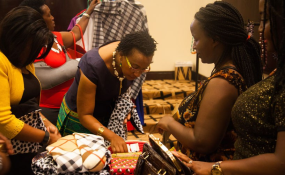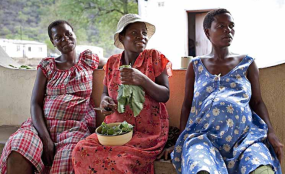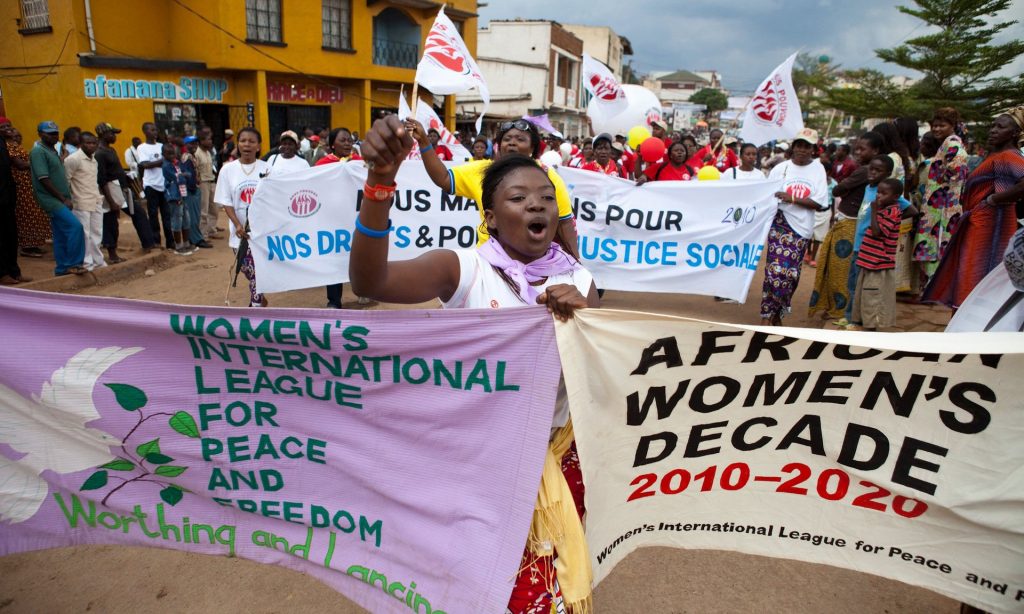On a warm Wednesday night in November 2015, a large group of women, children and men have gathered outside Grahamstown’s City Hall. Many people have on jackets or blankets, some children are wearing pyjamas, and bread and soup in paper cups are being passed around.
Other paper cups shelter candles, some lit, others not. Some women have sat in a line across the street. Several police cars are parked a few metres away from their barricade.
The women are refusing to move until they are taken seriously. During one of many altercations, a policeman gets into his car and drives fast towards them. Frightened, the women move and thankfully nobody is hurt, but only just.

A child is yanked out of harm’s way just in time. Nearly a year has passed since this all-night protest vigil organised by the Voices of the Foreigner’s Wives which soon afterwards mobilised into Voices of Women of Africa.
On October 21, 2015, while Grahamstown SAPS were largely preoccupied with student protest on one side of town, a looting spree swept across the other. For weeks, rumours had been circulating that a foreign national – perhaps from Pakistan or Bangladesh – was responsible for the latest string of murders that had plagued the township, so shops owned by foreign nationals were targeted.
At least 500 people were displaced and many shop owners had to leave their homes, families and businesses for a safe house outside town.
For weeks after that first Wednesday, these families lived under precarious conditions. The men depended on private donations for their sustenance, but while back home, their families lived in fear of another two attacks the rumour mills had promised.

For fear of safety or lack of merchandise, they could not re-open their shops, which meant they had no work or money to replace what they had lost during the meeting. They were shunned or violently rejected from public spaces.
“My son was violated at school because of his race, because he is Pakistani. Before the looting, he was always bullied for his hair and skin colour; when the looting started, our people chased the Pakistani children and I personally had to run home with my son because they wanted to hurt him.” says Nicki Basson, mother of two.
Concerned, two women, Patricia May and Sandiswa Mini, put out a public call: “We started looking for some women to help us out with this thing. We said, ‘If you are from Africa and your husband is a foreign national, can you please stand up with us to voice out for our husbands, brothers and in-laws?’”
Babalwa Nizam, recalling the daily violence her choice in husband attracts, thought to herself, “I don’t have a choice; I have kids. I have to fight for my kids.”
About six or seven women came together to form the Voices of the Foreigners’ Wives. With support from the Unemployed People’s Movement (UPM), some students and Masifunde, a local NGO, these women mobilised their community in protest against the violence perpetrated by their neighbours, and against the local authorities’ inactivity or, alternatively, their complicity with the ongoing looting. These were their demands:
- Stop the xenophobic attacks in Grahamstown.
- Stop the murder and rape of women in Grahamstown.
- Build an economy that creates opportunities for all.
- Provide housing and services for all.
- Allow our husbands to return to their families.
- Stop the rumours about our husbands.
- Stop religious discrimination.
- Stop councillors from dividing people.

